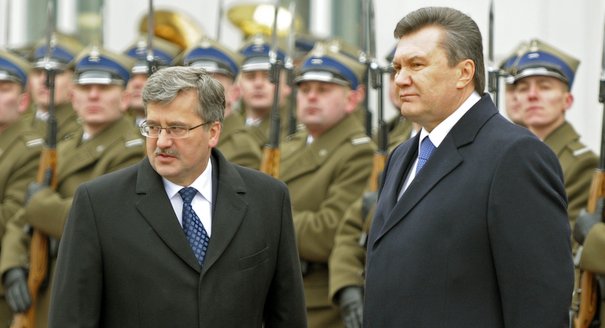Poland is basking in the limelight.
And so it should.
As it co-hosts the European Football Championships with its neighbor Ukraine, the Polish government has the chance to show off what a confident country it has become since joining the EU in 2004. It is one of the few European Union member states to have avoided sliding into recession as a result of the euro crisis.
This confidence is expressed in other ways too.
Under Donald Tusk’s center-right government, Poland has become more assertive about the direction of Europe’s foreign, security, and defense policy.
It has given a lot of attention to the EU’s European Neighborhood Policy (ENP) that is supposed to attract countries including Belarus, Ukraine, Georgia, Armenia, and Moldova towards Europe through closer economic, trade, and political ties.
Polish officials believe it is in their national interests to support but also push this policy with one objective in mind. It wants the non-EU countries along its eastern borders to be as secure, prosperous, and democratic as possible so as to provide a buffer between Poland and Russia.
The reason is that Poland does not trust Russia’s intentions.
This may seem surprising given that the Tusk government has made enormous efforts to reach out to Russia, so long the sworn enemy of the Polish people.
But the results of Warsaw’s overtures have been disappointing, especially now that Vladimir Putin is back as president in the Kremlin.
During Putin’s election campaign, Polish officials took careful notice of his attacks on NATO, his promises to strengthen the Russian military and his support for closer ties to countries that used to be part of the Soviet Union.
In Ukraine, Moldova, and Belarus, Russia is making every effort to assert its economic and political influence mostly through its energy policy, its most powerful weapon.
Poland used to believe that it would be possible to counter the Russian influence on these countries through closer ties to Europe. The hope was that the ENP and EU negotiating bilateral trade and economic accords would bolster them against Russia’s influence, and strengthen the democracies.
So far, this has not worked, especially not in Ukraine, not to mention Belarus.
That is why Poland is now trying a different tack with Ukraine.
For all its deep commitments to Europe having a strong, effective, and united foreign policy, Poland recently broke ranks with most of its EU counterparts over Ukraine.
The issue was whether European leaders should boycott the European Football Championships because of the continuing imprisonment of the former Ukrainian prime minister Yulia Tymoshenko.
Angela Merkel, the German Chancellor and several other EU leaders, including the President of the Commission, José Manuel Barroso, said they would not be attending matches played in Ukraine.
That did not have the slightest effect on Ukraine’s president, Viktor Yanukovich.
The rivalry and animosity between himself and Tymoshenko is so intense that Yanukovich, even at the expense of Ukraine’s image and its relations with the EU, chose to suffer boycotts rather than seek a compromise over Tymoshenko, whose imprisonment many believe is politically motivated.
Poland, however, opposed the boycott. Not only that.
Bronislaw Komorowski, the Polish president, last Friday rolled out the red carpet in the gorgeous Belvedere Palace in Warsaw for Yanukovich to celebrate the start of the football championship.
Poland’s attitude seems contradictory.
Its leaders strongly believe in the rule of law and human rights. But they also fear that Yanukovich will move closer to Russia if the EU puts too much pressure on Ukraine.
From Yanukovich’s perspective, this fear is the perfect card to play in his dealings with EU leaders, especially if Europe wants democracy and stability on its eastern borders.
But does Yanukovich really want Ukraine, a proud and independent country, to fall into Russia's orbit? For Poland and the other Europeans, the problem is that it is very hard to know how far Yanukovich is bluffing. That makes it even more difficult for Europe to implement a long term strategy that will work in Ukraine.
Yet young people, the growing middle class, and big business would oppose being tied to Russia, according to opinion polls. They want visa-free travel, western investment, and transparency to strengthen democracy and the market economy.
The Polish government, which is acutely attuned to the dynamics of Ukrainian politics and society, is perfectly aware of this.
Yet it does not put much trust into the strength of this emerging civil society. Instead, it dares not call Yanukovich’s bluff because of its own long-held fears of Russia.
For now, football reigns supreme. But after the last match is played, it is time for Warsaw to reconsider its Ostpolitik.





.jpg)
